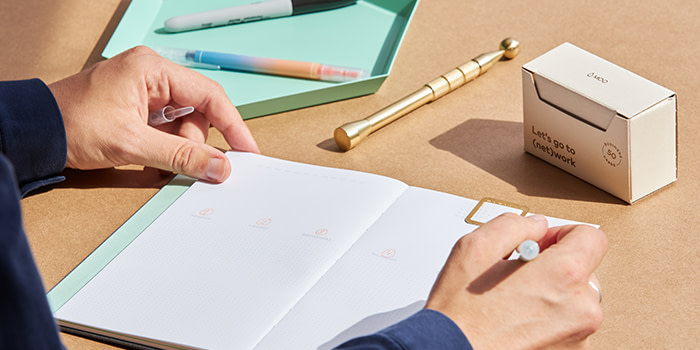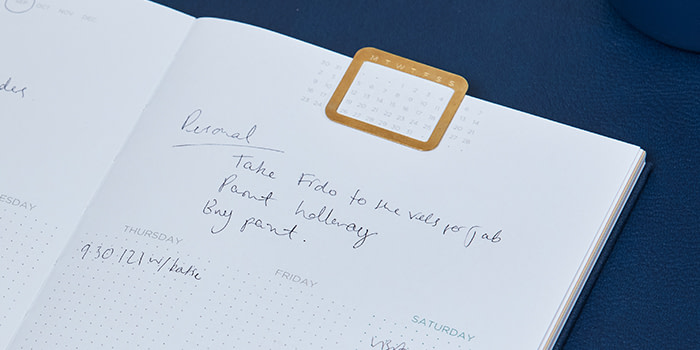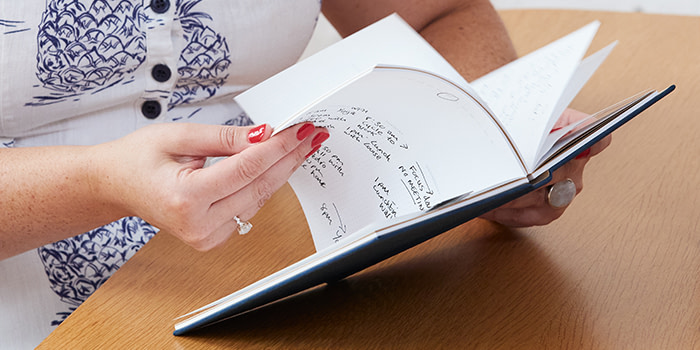How to achieve your goals on paper (and IRL)
Here’s some advice to adopt a “plan do” attitude – with tips from our creative community.

“What is not started today is never finished tomorrow.” That great piece of advice from Johann Wolfgang von Goethe has not aged a bit. Yet, we’re still struggling to get down to it sometimes.
Reaching your goals requires preparation and a good dose of motivation. Here’s some advice to adopt that “plan do” attitude – with tips from designer Luke Tonge and illustrator Maïa Faddoul.
Set your goals the smart way
It all starts with goal-setting. What stands between you and your dreams is often taking that first step towards making it a reality. In order to set a goal that’s both realistic and makes sense for you, try using “SMART” objectives. But what even is that?
The “smart” is SMART goals stands for:
- Specific: Dreams can be fuzzy. Goals should be clear. When setting SMART objectives, you should use tangible, specific terms that don’t leave room for interpretation.
- Measurable: A target that can’t be measured is like a dartboard without a bull’s eye. How are you supposed to reach your goals if you don’t know what to aim for?
- Achievable: Keep your objective realistic and make sure your SMART goal is, well, smart. “King of the world” is NOT an attainable objective.
- Relevant: Your goal should fit nicely into your career or personal growth and makes sense based on your interests and values.
- Time-bound: Ah, deadlines. They might be scary, but they’re the engine that propels us forward and keeps us from procrastinating too much. Give yourself a reasonable timeline to achieve your goals. It will help, we promise.

Don’t self-sabotage
When striving to achieve our goals, most of us have to deal with the looming shadow of procrastination and imposter syndrome. Behind that dreaded word hides a myriad of fears, starting with the most common one: failure.
For Luke Tonge, graphic designer, art director and director of Birmingham Design, this is something you should process and accept early on to unlock your full potential. “Failure is a really complex subject in creative work because, as any practitioner will know, it’s just part of the process…
“We try countless things that don’t really work well to get to the outcome that hopefully does! So without ‘failure’, there is no ‘success’. Fear of failure can cripple any chance of great work. I’m a big believer in leaning into the unknown and embracing many little fails to guide towards the good.
“Of course, there is also *real* failure… when something truly bombs or is so badly done it deserves that title – but this is usually quite rare, avoidable, and always a good teacher! Fail to prepare… prepare to fail.”
Pri-o-ri-tise
If you’re a creative mind, chances are you have not one, but many goals. Unfortunately, you’re only human, and you can’t lead 27 projects at the same time. Or at least, not if you want to do a good job or avoid burnout. Accept that some things take time, and it’s okay not to do everything at once. Pick a more accessible goal to start with, and plan bigger projects in the longer term.
When things get overwhelming, Tonge likes to look at the big picture. “I often have several set goals on the go, from small, simple, achievable things right through to grand career-spanning hopes and dreams. It can feel overwhelming when they’re all swirling around fighting for priority.
“I’m learning to tame and quiet some of those voices and remember that a career is hopefully a long time(!) and it’s ok to let the bigger ones simmer in the background until their time is right to surface. I also think mulling things over for a while helps you realise which ideas really are worth holding onto – and which were just fool’s gold.”

Pace yourself
It’s easy to feel overwhelmed when trying to do too much, too fast. Time takes time! You can’t expect to achieve your goal in one fell swoop. Faddoul recommends breaking down daunting tasks into bite-size ones. Any objective is made of many, many smaller steps. Make sure you account for each of those in your plan. Bite-size goals make for big achievements.
For Tonge, patience helps you do your best work. “My biggest obstacle regarding achieving goals tends to be a mixture of capacity (or lack of) and impatience! I have to remind myself it’s ok to not be able to do everything right away. As ‘Buck 65’ once said ‘fast ain’t always better than slow, ya know?’ I’m a believer that good things come to those who not only wait but also plan and work really hard.”
Get planning
Bringing your ideas to life without goal-planning is like cooking without a recipe. If it’s your first time, chances are you’ll mess up the quantities or forget an ingredient (unless you’re Remy the rat from Ratatouille). Maïa Faddoul, illustrator and designer in Montreal, believes in the power of planning to fight procrastination. “Make things easy for yourself. Do it for future-you!”
Grab your Planner, your digital organiser, or both, and lay out all the small steps and items to cross off in order to achieve your final goal. It will make everything look more achievable once broken down into small bites.
“When something is big and scary, it shouldn’t mean it’s impossible or foolish to pursue”
The planning stage takes time and can be scary. It’s also the best way to reach your goals. Don’t abandon a project you care about because you’re not sure how to approach it. Start very, very small and go from there. For example, you can add “create an inspiration board on Pinterest” as your first item. Looks fun, right?
Tonge warns against letting fear dictate your ambitions. “When something is big and scary, it shouldn’t mean it’s impossible or foolish to pursue. It usually just means it’s got the potential to be awesome and will require time, help, and good planning to accomplish. It’s easy to self-sabotage and limit your vision when in this scary planning phase.”
Don’t do it alone
Things can get difficult when you have to work on your own. Why not find like-minded people to work with towards your goals? Tonge believes in collaboration to plan and achieve your goals effectively. “I think it’s important to get other people on board who can share the vision and the burden with you, to remind you about the possibility, not just the problems!
“There’s one of those sayings that circles around the internet from time to time that is really relevant here: ‘If you want to go fast, go alone. If you want to go far, go together.’ Simple things usually need singular focus to accomplish, but the big scary stuff I’ve found always benefits from teamwork.”
Read more about how feeling supported helped marathon runner Adrianne Haslet reach her goals here.
Create workspace magic
Work isn’t a purely mental process. Your workspace also contributes to creating a favourable environment for ideation and productivity. Setting up your desk or studio in a way that works for you can help you fight procrastination, failing motivation, and even stress headaches.
For Faddoul, where you work is as important as how you work to keep you happy and motivated. “Overcoming procrastination to me is all about tricking your own brain. Take yourself on a coffee date to do the boring stuff. Keep your workspace clean so you want to show up and use it.” It’s all about keeping you excited to work towards your goals.
Struggling to get into the flow? Check out remote work guru Laurel Farrer’s tips on staying focused here.

Keep track, don’t crack
Feeling that you’re doing progress is essential to stay motivated. That’s another benefit of planning well. If you’ve listed the tasks that will take you to the finish line, it will be easier to track how far along you are.
Use your action plan to ensure you’re on the right path and not falling behind on your project. If you are, this is an opportunity to reassess priorities and identify blockers, but also to ask yourself if you need any help achieving your goals.
You can keep track of your progress in your Notebook or Planner, or use a task management tool like Notion. In any case, crossing items or ticking boxes off your list is easily one of the most satisfying parts of goal-tracking.
Celebrate the small wins
Working towards ambitious goals usually takes time, and it can be easy to lose motivation and momentum. A great way to counter this is to celebrate each step successfully completed. No need to wait for everything to be finalised to pat yourself on the back!
For Tonge, it’s important to look back from time to time. “I already juggle a number of different roles so sometimes, achieving those bigger goals can feel totally unrealistic… Yet, when I look back, I can clearly see those chunkier things get eventually ticked off the list.
“So this is a reminder (especially if, like me, you’re always moving quickly on to the next thing) to occasionally look back in the rearview mirror and take stock of all you’ve achieved, and to celebrate those wins, whether small or big.”
Those who plan, do. Reach your goals on paper and IRL with Perpetual Planners.
Keep in touch
Get design inspiration, business tips and special offers straight to your inbox with our MOOsletter, out every two weeks.



